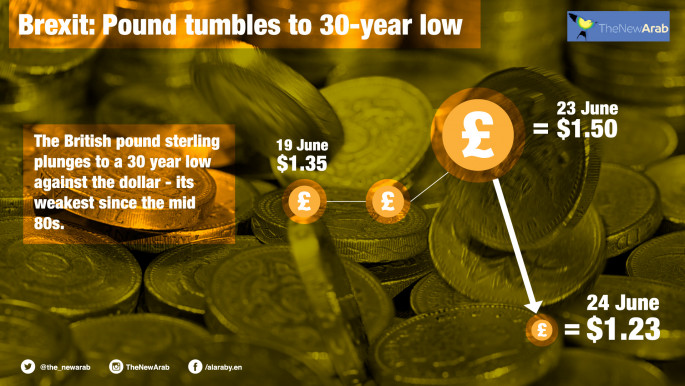Pound, global stock markets collapse as Britain quits EU
The pound collapsed and world stock markets descended into pandemonium on Friday after Britain voted to leave the European Union, fuelling a wave of global uncertainty.
Sterling hit a 31-year low, crashing 10 percent to $1.3229 at one point, and the euro also plummeted against the US currency as the Brexit result caught markets by surprise.
European stock markets went into free fall at the opening, mirroring a rout in Asian markets, which were still open as the referendum results trickled in.
The London FTSE-100 index was down by around 5 percent in morning deals, having come off early lows after British Prime Minister David Cameron announced his resignation.
Banking stocks led the way down, with Royal Bank of Scotland, Barclays and Lloyds all losing close to a quarter of their market value at the opening.
"The British people have voted against the economic warnings of the overwhelming majority of expert economic opinion. Not surprisingly, this morning the referendum result has sent shock waves through global financial markets," said Daniel Vernazza, economist at UniCredit Research.
The Eurozone's main markets, Frankfurt and Paris, both fell more than 10 percent at one point, as financial stocks took the biggest hit.
In the weeks leading up to Thursday's historic vote, there had been widespread warnings that a "Brexit" would cause a rout across global markets that would wipe trillions off valuations.
Markets wrong-footed
But investors were still clearly wrong-footed by the vote outcome. European stock markets and the pound had gained steadily in the run-up to the referendum on the basis of polls and bookmakers' predictions.
"It's scary, and I've never seen anything like it," James Butterfill, head of research and investments at ETF Securities, said in London.
"A lot of people were caught out, and many investors will lose a lot of money," he told Bloomberg News.
Fears are also growing that other EU members will push for referendums, posing the biggest threat to the future of the grouping since its inception almost 60 years ago.
 |
The British people have voted against the economic warnings of the overwhelming majority of expert economic opinion. Not surprisingly, this morning the referendum result has sent shock waves through global financial markets - Daniel Vernazza |
 |
That worry pushed stock markets in the Eurozone's weaker southern economies even lower than those at the core, with Milan stocks falling 10 percent in early business, Madrid 12 percent and Athens by 15 percent.
"Leave's victory has delivered one of the biggest market shocks of all time," said Joe Rundle, head of trading at ETX Capital.
The dollar slumped briefly to 99.02 yen, the first time it has gone below 100 yen since November 2013, before edging back up above 102 yen. The Japanese unit is considered a safe bet in times of uncertainty and turmoil.
The Bank of Japan said Friday it was ready to work with other central banks to pump cash into financial markets to combat wild swings, while the Bank of England said it would take "all necessary steps" to avert a full-blown crisis, including pumping more than 250 billion pounds ($370 billion, 326 billion euros) into the financial system if needed.
Seeking safety
The Swiss central bank intervened in the foreign exchanges to stem the rise of the Swiss franc which surged on safe-haven buying.
Investors also sought the relative safety of government bonds. The price on the German benchmark 10-year sovereign bond rose sharply, pushing its yield into negative territory for only the second time in its history.
UK government bonds also rose, taking their 10-year yield to a historic low.
Gold, a traditional refuge asset, struck a two-year high.
But elsewhere, billions of dollars were wiped off investment portfolios.
India's rupee, the Canadian dollar and the Singapore dollar all suffered heavy losses, while the South African rand lost six percent on the day as emerging markets were hurt by sudden risk-aversion.
The prospect of a severe hit to the global economy also hammered oil prices, with both main contracts slumping more than six percent.
 |
|





 Follow the Middle East's top stories in English at The New Arab on Google News
Follow the Middle East's top stories in English at The New Arab on Google News
![The UAE is widely suspected of arming the RSF militia [Getty]](/sites/default/files/styles/image_330x185/public/2024-11/GettyImages-472529908.jpg?h=69f2b9d0&itok=Yauw3YTG)
![Netanyahu furiously denounced the ICC [Getty]](/sites/default/files/styles/image_330x185/public/2024-11/GettyImages-2169352575.jpg?h=199d8c1f&itok=-vRiruf5)
![Both Hamas and the Palestinian Authority welcomed the ICC arrest warrants [Getty]](/sites/default/files/styles/image_330x185/public/2024-11/GettyImages-2178351173.jpg?h=199d8c1f&itok=TV858iVg)